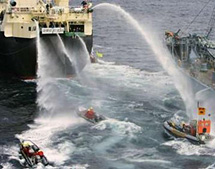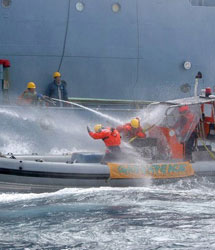 |
 |
 |
 Editorials | Environmental | December 2005 Editorials | Environmental | December 2005  
Pressure Mounts on Japan's Whaling Fleet
 Andrew Darby - The Age, Australia Andrew Darby - The Age, Australia


| | 
| | Cold comfort: Greenpeace inflatable vessels and their crews are soaked by hoses from Japanese whaling ships in the Southern Ocean as they try to disrupt the whale hunt.
(Photo: AFP) |
The Japanese whaling fleet threw off attempts to stop it operating yesterday, as pressure rose against the Antarctic hunt.

Greenpeace activists in high-speed inflatables spent hours trying to put themselves between chaser boats and minke whales south of Tasmania and claimed some whales got away.

"We've certainly succeeded in slowing down the hunt, though unfortunately eventually they did kill a whale," expedition leader Shane Rattenbury said.

A second front is about to open in the campaign when one of the whaling fleet, the Kaiko Maru, a scouting vessel, arrives in Hobart to evacuate a crew member with appendicitis. Activists are expected to try to prevent it from returning to Antarctica.

"Greenpeace and a number of other organisations want to make sure the ship does not return to the whaling grounds, and that it is not resupplied or refuelled in Hobart," said the organisation's Australian chief executive, Steve Shallhorn.

Direct action against the whalers is also set to rise, with the hardline group Sea Shepherd likely to arrive off Commonwealth Bay today, saying that unlike Greenpeace it intends to stop the fleet from whaling.

Prime Minister John Howard said that at a recent meeting with Japanese Prime Minister Junichiro Koizumi he had raised the whaling issue.

"I did not lose the opportunity of telling him of my continued opposition to Japan's position on whaling," he said. "However, I do not support action which endangers lives or breaks the law."

Environment Minister Ian Campbell said he suspected most Japanese people would be horrified to see what their fleet was doing in the name of scientific research. Japan expects to take 935 minke whales and 10 fin whales this summer under a self-awarded scientific permit outside a global moratorium on commercial whaling.

Senator Campbell said Australia was powerless to halt the hunt legally. "If I thought I could bring an end to the slaughter that is occurring in Australian territory at Antarctica right at the moment by sending a lawyer to a court somewhere in the world I would have done it."

Senator Campbell rejected calls from Greenpeace and Greens leader Bob Brown to detain the Kaiko Maru in Hobart as a pirate fisher after it drops off the ailing crew member tomorrow.

"I think anyone who suggests that something happens to that vessel when it gets here, or somehow it won't be allowed to leave again, would send a signal to the owners of the vessel, the skipper of the vessel, not to approach an Australian port, and to that extent would imperil the crewman's life."

Australian customs confirmed it would be clearing the vessel and assisting in the evacuation. Mr Shallhorn said Greenpeace had reason to believe the ship could not return to the whaling grounds without refuelling.

The Japanese Fisheries Agency declined to comment through a spokesman. In a statement, the Institute of Cetacean Research in Tokyo said it feared for the safety of its crew and scientists after a collision between the Greenpeace ship Esperanza and its chaser vessel on Wednesday.

The tension is expected to rise with the arrival of Sea Shepherd's ship Farley Mowat.

Its captain, Paul Watson, has a long history of incapacitating whaling ships, including ramming and sinking them, but without injury or loss of life.
New Zealand Says Japan's Whaling Programme Lacks Scientific Credibility
AFP

The New Zealand government has released a damning report on Japan's whaling programme, saying it lacks scientific credibility.

Conservation Minister Chris Carter said that under the programme now underway in the Southern Ocean, known as JARPA II, Japan would more than double the number of whales it killed.

"Those whales will be killed inside the Southern Ocean Whale Sanctuary and well outside Japan's own territorial waters," he said in a statement Thursday.

"For any nation to contemplate this kind of programme, it should at the very least have a robust scientific justification. Japan does not."

"This critique has been compiled by New Zealand's internationally respected whale experts. It demonstrates that the reasons Japan is using to kill whales in the Southern Ocean lack scientific credibility."

At a meeting of the International Whaling Commission in South Korea in June, Japan failed to get approval for its proposal that commercial whaling be resumed after a 19-year moratorium.

But it announced it would double its so-called scientific whaling programme, under which it says it hunts whales in the name of research. Critics say the programme is simply a means to get around the moratorium.

The environmental group Greenpeace this week tracked down the Japanese whaling vessel Nisshin Maru off the Antarctic coast and watched a whale being harpooned.

Greenpeace crew said their boat was later rammed by a smaller Japanese capture boat.

The New Zealand report concludes that most of the data purportedly collected in Japan's programme is not needed to manage whale stocks, and the few objectives with some relevance to conservation can be addressed better using non-lethal methods.

It also says the proposed kills are being undertaken in the International Whaling Commission-approved Southern Ocean Whale Sanctuary which was set up to allow a scientific study of the recovery of whale stocks without whaling. | 
 | |
 |



